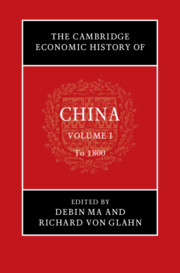Book contents
- The Cambridge Economic History of China
- The Cambridge Economic History of China
- The Cambridge Economic History of China
- Copyright page
- Contents
- Figures
- Maps
- Tables
- Contributors to Volume I
- Acknowledgments
- Note on Citations
- Introduction to Volume I
- Part I Before 1000
- 1 The Economy of Late Pre-imperial China
- 2 Agriculture and Its Environmental Impact
- 3 State and Economy
- 4 Money, Markets, and Merchants
- 5 Economic Philosophy and Political Economy
- 6 Silk Road Trade and Foreign Economic Influences
- Interlude
- Part II 1000 to 1800
- Bibliography of Primary Works Cited
- Index
- References
5 - Economic Philosophy and Political Economy
from Part I - Before 1000
Published online by Cambridge University Press: 07 February 2022
- The Cambridge Economic History of China
- The Cambridge Economic History of China
- The Cambridge Economic History of China
- Copyright page
- Contents
- Figures
- Maps
- Tables
- Contributors to Volume I
- Acknowledgments
- Note on Citations
- Introduction to Volume I
- Part I Before 1000
- 1 The Economy of Late Pre-imperial China
- 2 Agriculture and Its Environmental Impact
- 3 State and Economy
- 4 Money, Markets, and Merchants
- 5 Economic Philosophy and Political Economy
- 6 Silk Road Trade and Foreign Economic Influences
- Interlude
- Part II 1000 to 1800
- Bibliography of Primary Works Cited
- Index
- References
Summary
The genesis of Chinese political economy can be traced to the Warring States era (453–221 bce), which was marked on one hand by rapid economic progress (the spread of iron metallurgy, advances in agricultural productivity, the invention of coinage, and the emergence of a private merchant class) and on the other hand by the rise of autocratic states (accompanied by the centralization of political power and mass mobilization for war). The economic principles and policies that later shaped the formation of the first unified empires – what I will designate the militarist–physiocratic state – were enunciated by leading ministers of the most successful autocratic states, such as Li Kui in Wei and Shang Yang in Qin, and set down in works such as The Book of Lord Shang and Han Fei Zi.
Keywords
- Type
- Chapter
- Information
- The Cambridge Economic History of China , pp. 166 - 202Publisher: Cambridge University PressPrint publication year: 2022

